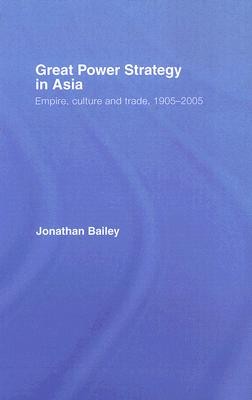
- We will send in 10–14 business days.
- Author: Jonathan Bayley
- Publisher: Routledge
- ISBN-10: 0415404584
- ISBN-13: 9780415404587
- Format: 16.4 x 23.9 x 2.4 cm, hardcover
- Language: English
- SAVE -10% with code: EXTRA
Reviews
Description
Great Power Strategy in Asia, 1905-2005 analyzes the enduring themes underlying the strategic struggles in East Asia, beginning with the crucial event of the 1904-5 Russo-Japanese War.
Jonathan Bailey clearly shows why military history is highly relevant in understanding today's strategic problems, and how the most important areas of current affairs have their roots in often forgotten corners of military history. He makes his powerful case in three clear sections:
- an analysis of the explosive factors that led to war between Russia and Japan in 1904, presenting a ten-year perspective of the War, focusing on its consequences: cultural shock in 'the West', re-alignment of Asian imperial geography and the failure to learn vital military lessons, as World War I approached
- a thirty-five year perspective of the war, showing why Japan repeated the essential strategic, operational and tactical ploys of its war against Russia in 1904 in its strike upon the USA in 1941. Allied victory assured the downfall of Europe's empires in Asia, with the USA inheriting much of the old imperial legacy
- a centennial view of the Russo-Japanese War, which demonstrates that many of the broader issues identifiable in 1904-05 remain at the heart of today's strategic discourse: Western apprehension about the economic rise of Japan; the anomalies of an 'American Empire'; tensions between Occident and Orient; the apparent new relevance of geopolitics; and the importance of demography in perceptions of global power.
This book is multidisciplinary, emphasizing the linkages between imperial power-politics, military operations, cultural conflict and commercial rivalry. It is also the story of military innovation, the pathology of learning lessons from the experience of war, and the anticipated rise of Asian, or more specifically Chinese, power a century after the false dawn of the Japanese victory in 1905.
This book will be of great interest to all students of the Russo-Japanese War, Asian security, and of military and strategic studies.
EXTRA 10 % discount with code: EXTRA
The promotion ends in 19d.23:22:48
The discount code is valid when purchasing from 10 €. Discounts do not stack.
- Author: Jonathan Bayley
- Publisher: Routledge
- ISBN-10: 0415404584
- ISBN-13: 9780415404587
- Format: 16.4 x 23.9 x 2.4 cm, hardcover
- Language: English English
Great Power Strategy in Asia, 1905-2005 analyzes the enduring themes underlying the strategic struggles in East Asia, beginning with the crucial event of the 1904-5 Russo-Japanese War.
Jonathan Bailey clearly shows why military history is highly relevant in understanding today's strategic problems, and how the most important areas of current affairs have their roots in often forgotten corners of military history. He makes his powerful case in three clear sections:
- an analysis of the explosive factors that led to war between Russia and Japan in 1904, presenting a ten-year perspective of the War, focusing on its consequences: cultural shock in 'the West', re-alignment of Asian imperial geography and the failure to learn vital military lessons, as World War I approached
- a thirty-five year perspective of the war, showing why Japan repeated the essential strategic, operational and tactical ploys of its war against Russia in 1904 in its strike upon the USA in 1941. Allied victory assured the downfall of Europe's empires in Asia, with the USA inheriting much of the old imperial legacy
- a centennial view of the Russo-Japanese War, which demonstrates that many of the broader issues identifiable in 1904-05 remain at the heart of today's strategic discourse: Western apprehension about the economic rise of Japan; the anomalies of an 'American Empire'; tensions between Occident and Orient; the apparent new relevance of geopolitics; and the importance of demography in perceptions of global power.
This book is multidisciplinary, emphasizing the linkages between imperial power-politics, military operations, cultural conflict and commercial rivalry. It is also the story of military innovation, the pathology of learning lessons from the experience of war, and the anticipated rise of Asian, or more specifically Chinese, power a century after the false dawn of the Japanese victory in 1905.
This book will be of great interest to all students of the Russo-Japanese War, Asian security, and of military and strategic studies.


Reviews